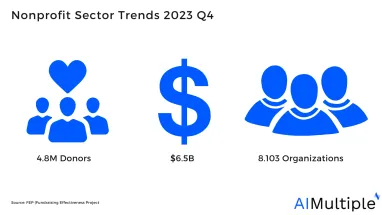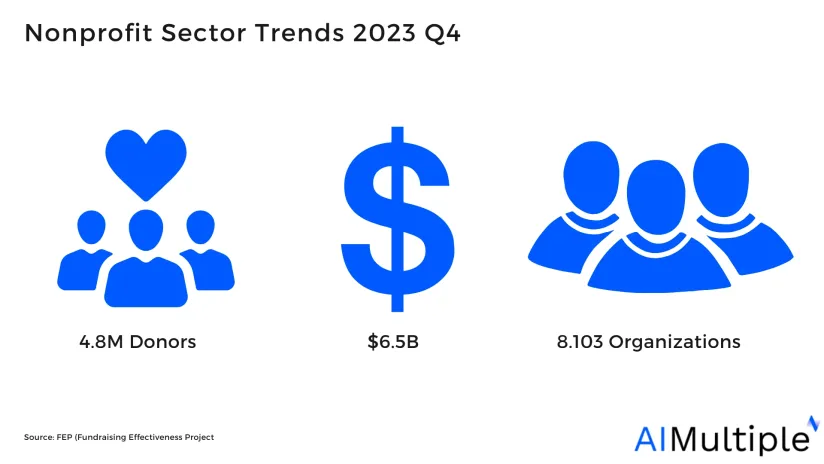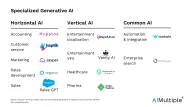AI Fundraising in '24: 17 Tools & Use Cases and Key Insights


Artificial intelligence (AI) fundraising tools are increasing the efficiency of fundraising.
The market provides a variety of AI-driven solutions customized to meet the needs of organizations of all sizes, ranging from small businesses to large corporations. This article will explore the specific AI tools designed to optimize fundraising for organizations across this spectrum.
Check out some examples to learn how nonprofit can develop in the field of accounting:
- Nonprofit Accounting in 2024: Key Insights & Challenges
- 10 Nonprofit Accounting Software ’24 Based on 23K+ Reviews
Featured image: Global nonprofit sector trends in 2023 Q4
10 common fundraising software
| Vendor | Number of Reviews | Rating | Pricing |
|---|---|---|---|
| Bloomerang | 2,218 | 4.7 | Standart: $125** |
| Givebutter | 1,156 | 4.7 | Free* |
| OneCause, formerly BidPal | 821 | 4.7 | Custom |
| Neon CRM | 679 | 4.4 | Essentials: $99 Impact: $199 Empower: $399 |
| Bonterra Development & Digital | 557 | 4.1 | Basic: $109 |
| DonorPerfect | 535 | 4.4 | Core: $99 Plus: $199 Pro: $649 |
| Zeffy | 400 | 4.9 | Free |
| Keela | 303 | 4.4 | Standart: $99 |
| Donorbox | 254 | 4.8 | Standart: Free Pro: $139 |
| Blackbaud Fundraising | 17 | 4.2 | Custom |
*Regardless of the chosen option, standard processing fees of 2.9% plus 30 cents apply to all payment methods, with the exception of ACH transactions, which incur a lower fee of 1.9% plus 30 cents per transaction.
**The Bloomerang plan you select depends on the number of records (or contacts) you manage in the database. Each plan includes unlimited user access.
Table features
- Vendors in the table are sorted out according to the number of reviews extracted from major review websites such as Capterra, G2 and Trustradius.
Vendor selection criteria:
- Review numbers: Vendors with 300+ reviews are included in the list.The presence of vendors in popular lists on sites such as G2 and Capterra was also taken into consideration.
- Average scores: Vendors with more than 3.5+/5 average score are included in the list.
7 AI fundraising tools for different purposes
| Vendor | Purpose | Number of Reviews | Rating | Pricing |
|---|---|---|---|---|
| Pairsoft | CRM integration* Fundraising automation Accounting & accounts payable automation | 135 | 3.8 | Custom |
| Texta | Writing assistant for projects, e-mails & more | 567 | 4.4 | Individual: $39 Business: $79 Enterprise: $239 |
| RapidMiner | Donor data analysis | 547 | 4.6 | Custom |
| Otter.ai | Meeting asssistant | 188 | 4.2 | Basic: Free Pro: $16.99 Business: $30 Enterprise: Custom |
| DonorSearch | Donor search & identification Data vizualization | 72 | 4.6 | Custom |
| Botsify | Chatbots | 30 | 4.5 | Personal: $49 Professional: $149 |
| Lately | Social media management | 23 | 4.6 | 4 social channels: $49 10 social channels: $119 Unlimited social channels: $199 |
*Pairsoft can integrate as a native-plug in with CRMs and ERPs such as Blackbaud Raiser’s Edge. For more:
- Dynamics 365 in Accounts Payable Automation: In-Depth Review
- NetSuite Accounts Payable (AP) Automation in 2024
- Blackbaud Accounts Payable (AP) Automation in ’24: In-Depth Review
- Sage Accounts Payable (AP) Automation in ’24
Table features & vender selection:
- Apart from our sponsor, Pairsoft, vendors are listed based onreview numbers.
- Fundraising activities involve different practices, including accounting, data analysis, content writing, and project management. To provide clarity, we’ve included one representative vendor for each practice in the table.
- The table includes only vendors distinguished for their utilization of AI.
How do fundraising AI tools differ from general fundraising software?
Fundraising AI tools utilize artificial intelligence to:
- automate tasks
- personalize donor communications
- provide predictive analytics
- analyze large datasets
General fundraising software typically offers more basic functionalities like donor management, event scheduling, and payment processing without advanced AI capabilities.
8 use cases of AI fundraising
Artificial intelligence can significantly impact various facets of fundraising, especially within the nonprofit sector. Here are specific areas where AI can transform fundraising efforts:
- Donor outreach and engagement: AI can analyze historical donor data to optimize communication strategies. AI further can identify patterns in donor interactions which helps designing outreach through emails, phone calls, and social media posts.
- Identifying potential donors: As the representative examples in the table show, AI tools have reached large datasets to identify potential donors with characteristics similar to the existing donors.
- Personalization of donor interactions: During donor meetings or communications, AI can provide real-time insights and suggestions based on the donor’s previous interactions and preferences. This information helps personalize discussions. (chatbots)
- Predictive analytics: Using historical data and predictive models, AI can forecast fundraising outcomes based on different strategies and external factors.
- Task automation: AI can automate repetitive tasks such as data entry, scheduling donor meetings, and sending follow-up emails.
- Fundraising strategy: By analyzing outcomes from previous campaigns, AI can offer insights into what strategies worked best and predict future trends.
- Resource Allocation: AI can help organizations determine effective allocation of resources across different fundraising efforts.
- Content generation: The adoption of content generation AI tools in fundraising can enable nonprofits to automate and personalize communication, enhance donor engagement and contributions. Organizations can leverage generative AI for purposes such as personalized appeals, and grant writing.
Case study
Regional Parks Foundation partners with the Park District to organize fundraising campaigns and support events for children, disabled adults, seniors and others across its 65 public parks.
The organization just had five full-time employees, and manages to support ~$1.2 million worth of projects annually.
The Challenge
As a 501(c)(3) organization, the Regional Parks Foundation must keep detailed records and comply with strict regulatory standards. In 2004, before using PairSoft, the foundation was utilizing Blackbaud’s Raiser’s Edge and Financial Edge. However, they needed an additional solution for document and workflow management to handle tasks like accounts receivable, memberships, documentation, and audits.
The solution & results
PairSoft, working alongside the Blackbaud software, assists the organization in managing memberships and gift processing, accounts receivable for donations, invoicing, and accounts payable. PairSoft’s document scanning function also helps manage bookkeeping and journal entries.
By adopting PairSoft, the Regional Parks Foundation has automated several processes and saved a significant amount of money each year:
- Organization reported an immediate ROI due to decreased costs from overtime, errors, and project delays
- The time of document retrievals are decreased which could take a day, now happens in about a minute.
- The use of inexperienced workforce for archiving has been reduced now that the full-time staff can handle it.
- the accounting consultants could remotely access all necessary documents, shortening the quarterly close cycle by about three days each quarter.
- The Foundation has eliminated the need for physical storage boxes.1
5 steps to consider before choosing the AI tool
Data compatibility and integration
AI systems require consistent, high-quality data to function. Existing systems may have data in formats that are not readily compatible with new AI tools. Standardize data formats across all sources before integration. Choosing software with middleware or data integration tools that can help bridge the gap between different data systems and formats.
User adoption
Introducing AI tools can meet resistance from staff accustomed to traditional methods. Consider choosing software which is easy to implement or offer initial training.
AI Scalability
AI systems may not initially be configured to handle the scale or complexity of larger or growing fundraising campaigns. Choose AI solutions that offer scalability as a core and can handle increased loads and more complex data sets (Check Table 2 above).
Data privacy
Integrating AI into fundraising operations involves handling donor information. This requires compliance with data protection regulations.Regularly update security protocols and guarantee that the AI tool you choose integrates and comply with data protection laws.
Implementation costs
The initial cost of AI integration for digital gift officers and other fundraising roles can be too much to handle. Conduct a cost-benefit analysis to understand the long-term savings and efficiencies gained from AI integration. Consider starting with smaller, less costly AI initiatives to demonstrate ROI before committing to larger investments.
Technical limitations
Existing IT infrastructure may not support the most advanced AI functionalities required for fundraising strategies. Consider cloud-based AI solutions that can provide capabilities without the need for heavy upfront investment in physical infrastructure.
Support
Make sure the support is there. Reliable technical support is crucial for resolving any issues that might arise during the use of AI tools.
External links
External Links
- 1. ”Regional Parks Foundation Saves Thousands in Auditing Costs with PairSoft” Retrieved on 19 April, 2024.



Comments
Your email address will not be published. All fields are required.